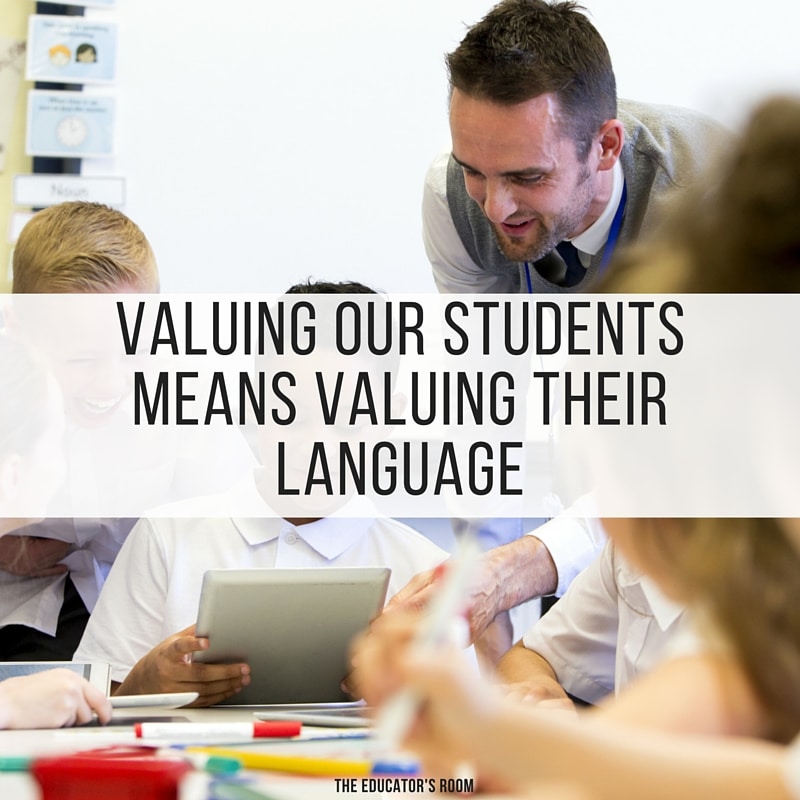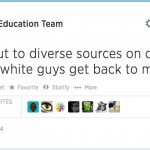Do your students use a lot of slang? Does it bother you? You’re not alone.
We teachers often see ourselves as defenders of intellectualism, and language is the vanguard of that defense. We see slang as yet another example of society’s decline, our unstoppable march toward know-nothingness, along with Snapchat and celebrity driven culture.
This view is ahistorical of course, forgetting that slang has always been a part of our evolving language. Shakespeare is credited for having made up thousands of words and nobody’s doubting his intellect. And also, humans are complex. We are capable of both using slang and demonstrating “more serious” thought.
Regardless, teachers often play into the generational trap of shaking our heads disapprovingly at our youth. Unfortunately, this disapproval is weighted differently for different populations.
The other day I was in the park with a group of students. While I pushed a group of 5th graders around in a circle on a tire swing as hard as I could, they screamed with joy. Another 5th grader shouted from the sidelines, “It’s lit!”
Not sure what that means? Don’t worry, we’ll get to that.
But first let’s pause to consider that this was said by a Black boy who also happens to be labeled as a difficult student. Over the past few years, I’ve heard his name discussed with tones of exasperation and dismissal. “He just care at all.” Accompanying this (false) narrative of apathy is a conception that he doesn’t know how to express himself (i.e. He’s “inarticulate”).
But clearly he does have the means to express himself. Not only that, he does so in a language (slang) that isn’t universal. His downfall is that his fluent language isn’t one that is valued by his school or dominant society.
Well, at least not when it’s used by someone who looks like him.
The thing about slang, particularly slang from young Black people, is that it is actually highly prized in certain contexts.
If you use Twitter or other forms of social media the influence of “urban” dialects is unavoidable. And what starts in the domain of a trending hashtag in the world of Black Twitter inevitably finds its way (awkwardly) into the hands of some PR or marketing intern.
<blockquote class=”twitter-tweet” data-lang=”en”><p lang=”en” dir=”ltr”>Pancakes on fleek.</p>— IHOP (@IHOP) <a href=”https://twitter.com/IHOP/status/524606157110120448″>October 21, 2014</a></blockquote>
<script async src=”//platform.twitter.com/widgets.js” charset=”utf-8″></script>
Young, white, middle-class people, particularly those living in cities, (i.e. The people both doing the marketing and being marketed to on social media) can’t get enough of Black slang! It seems like the quicker terminology is invented the quicker its coopted. “On fleek,” “squad,” and “keep it 100” are just a few recent examples.
So what we have is a reality where somewhere in New York City or San Francisco there’s a 20-something is getting paid $60,000 a year to run a Twitter account using the same slang my students stopped using 6 months ago.
It’s all a part of the same pattern: our country loves Black culture but it hates Black people.
Young white middle-class teachers who enter urban schools can often perpetuate this problem. Teachers College, Columbia University professor Chris Emdin describes this phenomenon in For White Folks Who Teach in the Hood…and the Rest of Y’All Too:
“A white female urban schoolteacher from an affluent background once told me that whenever she gets together with her friends, they say she’s “been in the ghetto with the black kids for too long” because of her frequent use of “street slang.” She giggled as she admitted that she sometimes “uses the kids’ phrases on purpose” to get a reaction from her friends.”
Meanwhile, inside our classrooms we expect their students to communicate using impeccable “proper” English. As Emdin explains, we look down upon our students who don’t fully grasp conventional academic English.
This isn’t to say we should substitute slang for academic language in our classrooms (except perhaps when necessary to engage students or help them see analogies). Removing the expectation of academic language creates another problem where in the name of cultural competence we still hold our kids back by withholding the means to decipher and utilize the language of power. We should respect the language the students bring to our classrooms, but we must also teach them the language they need to navigate broader, white-centered society.
Rather, my point is that we tend to ignore slang, as well as most other forms of Black and Brown knowledge, as a skill set our students hold. In doing so we continue to view our students as deficient. Instead we have to recognize the many things they know that just aren’t valued. It’s particularly frustrating to see slang fall into this category when it’s so readily employed by major companies for commercial purposes.
When the 5th grader on the playground said, “It’s lit,” he was just saying that things were getting exciting. But he said it in a way that was succinct, metaphorical, and more natural to his identity.
He also said it in a way that is likely incomprehensible to many white teachers. Unfortunately, he’s likely the only one who will be labeled uneducated for what he doesn’t know.






